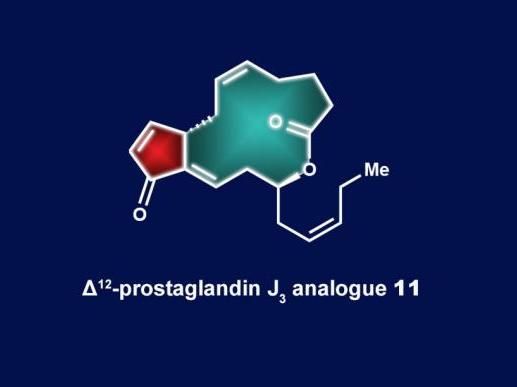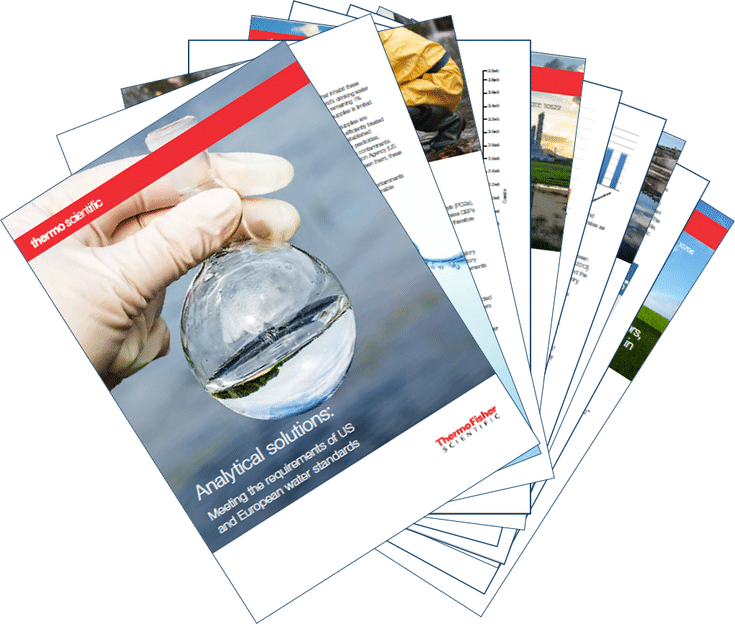Rice University lab simplifies total synthesis of anti-cancer agent
The lab of Rice University synthetic organic chemist K.C. Nicolaou has reported the streamlined total synthesis of delta12-prostaglandin J3, a molecule previously claimed to kill leukemic cancer cells.

This is a schematic of macrolactone 11, currently under evaluation as a preclinical cancer drug candidate by the Rice University lab of K.C. Nicolaou. Based on the structure of the natural product and using a streamlined synthesis, the lab is developing analogues as drug candidates.
K.C. Nicolaou Group/Rice University
The researchers said their work sets the stage for large-scale synthesis of the cytotoxic agent, a lipid found in nearly all animal tissues, and related compounds that can be produced as potential agents to treat certain types of cancer.
The Nicolaou lab specializes in the synthesis of therapeutic molecules found in nature, but in amounts too small for thorough biological evaluation or clinical use. Since joining Rice and setting up at the BioScience Research Collaborative in 2013, Nicolaou and his team have achieved the synthesis of several cancer-fighting molecules. Nicolaou is best known for the total synthesis of paclitaxel, a drug commonly used to treat a number of cancers.
The prostaglandin the Nicolaou lab synthesized had been isolated in 2011 as a secondary metabolite formed from eicosapentaenoic acid that is found primarily in fish oil.
The Nicolaou lab reported the first total synthesis of the molecule in 2014. That allowed them to confirm its structure. Now the lab has established techniques to develop related disease-fighting compounds and ramp up bulk production if necessary. Several such derivatives under consideration as preclinical drug candidates were detailed in a second paper by the lab this month.
The lab reported that total synthesis of the natural product now requires only six steps from commercially available starting materials. Such a concise and efficient route is highly desirable for the synthesis of preclinical drug candidates and drugs.
In the second paper, the Nicolaou lab identified a macrolactone derivative, formed by joining two functional groups together, as a promising chemotherapy agent to fight a variety of cancers. That publication in the Journal of the American Chemical Society described the synthesis of dozens of prostaglandin derivatives. Nicolaou said the National Institutes of Health's National Cancer Institute (NCI) tested their cytotoxicity against a variety of cancer cell samples.
"All of the compounds were sent to the NCI for testing," Nicolaou said. "In their initial tests, they give a high dosage to cancer cells to see if the compound has any activity. Some of them failed that test. But those that pass go for further testing at lower concentrations to see how powerful they are."
One derivative tested by NCI, designated as macrolactone 11, is currently under evaluation as a preclinical drug candidate, Nicolaou said. Related compounds macrolactone 33 and 44, which he said showed evidence of even higher potency against leukemia, lung cancer, colon cancer, melanoma, renal, prostate cancer "and several more we did not include in this paper," are also being considered for further testing by Texas Medical Center collaborators.
Results obtained in collaboration with the group of Mark Brönstrup, a professor at the Helmholtz Centre for Infection Research in Germany, led the researchers to suspect the molecule works by inhibiting the export of a translocation biosensor from a cancer cell's nucleus through a covalent addition to an export receptor.
The lab continues to develop drug candidates based on prostaglandin. "The macrolactones are very good - better than the natural product - and now we're following this lead to optimize the potency while minimizing toxicity. It's a balancing act," Nicolaou said.
"In the process we've developed a lot of nice chemistry, and we know a lot more about the biology of this compound," he said. "We've advanced organic synthesis in general and also enriched the knowledge about how these kind of molecules behave. We hope the papers provide some ideas and leads and inspiration for others to follow."
Original publication
Other news from the department science
Most read news
More news from our other portals
See the theme worlds for related content
Topic world Synthesis
Chemical synthesis is at the heart of modern chemistry and enables the targeted production of molecules with specific properties. By combining starting materials in defined reaction conditions, chemists can create a wide range of compounds, from simple molecules to complex active ingredients.

Topic world Synthesis
Chemical synthesis is at the heart of modern chemistry and enables the targeted production of molecules with specific properties. By combining starting materials in defined reaction conditions, chemists can create a wide range of compounds, from simple molecules to complex active ingredients.





























































